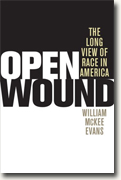Open Wound
William McKee Evans
book reviews:
· general fiction
· chick lit/romance
· sci-fi/fantasy
· graphic novels
· nonfiction
· audio books
· author interviews
· children's books @
curledupkids.com
· DVD reviews @
curledupdvd.com
newsletter
win books
buy online
links
home
for authors
& publishers
for reviewers

 |
Open Wound: The Long View of Race in America William McKee Evans University of Illinois Press Hardcover 344 pages March 2009 |
|
William McKee Evans is a North Carolina native who writes on behalf of the underdog. His former books include Ballots and Fence Rails, about Reconstruction in eastern North Carolina, and To Die Game, about outlaw Indians in the same region. In this latest book, he examines with an historian’s eye and an advocate’s intelligence the long, discouraging history of racial difference and conflict in America.
The second treatise of the book is that there have been three periods in American history when a window of opportunity opened for whites to relinquish this myth and for black slaves or slave descendants to break free of its cruel consequences. First was the founding of the nation, when the writers of national doctrine could have equated all people. They chose not to do so: “…few Patriots saw any disconnect between what they said about liberty and how they treated black people.” The second opportunity followed the Civil War, but there was again a disconnect as whites, inculcated in the racial myth, refused to give up their political and social power. This era brought the upsurge of groups like the Ku Klux Klan to put a lid on any lingering notions of equality that blacks might have nourished. The third time came during the Cold War when former colonies around the world gained independence, and with this rush to new freedom and respect, some American blacks acquired a new sense of power and positive identity. Large segments of the black population were still in ghettoes, still disproportionately locked in poverty. Evans believes that we are at another crucial historical juncture, with the environment itself being threatened and capitalism on shaky footing. There is the possibility that American blacks, with their history of coping with poverty and surviving the many winds of adversity, might yet have a chance to ascend during this new chaotic period. The light that can be shed on the crisis is the hope of solidarity in a “human family” that would finally abandon the differences of race and class. Originally published on Curled Up With A Good Book at www.curledup.com. © Barbara Bamberger Scott, 2009 |
|
|
|
 Click here to learn more about this month's sponsor! |
|
| fiction · sf/f · comic books · nonfiction · audio newsletter · free book contest · buy books online review index · links · · authors & publishers reviewers |
|
| site by ELBO Computing Resources, Inc. | |
 The central points of Evans’ book are two. The first, integral to understanding the second, is the fact that before the development of the American colonies, slavery was common enough in the world – but Americans changed the meaning of slavery. There had always been a Biblical and Koranic basis for slavery. Slaves were the spoils of war
and were often of the same ethnic group as the conquerors. They were rarely bound for life but had various means to free themselves over time. They were used for their labor, but not necessarily abused for their inferior status.
In the Americas, with the over-reaching need of Europeans for commodities such as sugar and cotton, and the concomitant greed of planters to supply that need, slavery took a new turn. Failing to subjugate the native peoples, planters began to import black African slaves for profit. The slave became a mere cog in the machine of capitalism, hopelessly bound for life and treated with shocking barbarity
- and as such, had to be vilified and seen as innately inferior to assuage any glimmer of Christian guilt in the minds and philosophies of their owners. This gave birth to what Evans calls the “white solidarity myth, the idea that white skin made one equal to any white and superior to any nonwhite.” It gave even non-slaveholders a stake in the continuation of the institution of slavery.
The central points of Evans’ book are two. The first, integral to understanding the second, is the fact that before the development of the American colonies, slavery was common enough in the world – but Americans changed the meaning of slavery. There had always been a Biblical and Koranic basis for slavery. Slaves were the spoils of war
and were often of the same ethnic group as the conquerors. They were rarely bound for life but had various means to free themselves over time. They were used for their labor, but not necessarily abused for their inferior status.
In the Americas, with the over-reaching need of Europeans for commodities such as sugar and cotton, and the concomitant greed of planters to supply that need, slavery took a new turn. Failing to subjugate the native peoples, planters began to import black African slaves for profit. The slave became a mere cog in the machine of capitalism, hopelessly bound for life and treated with shocking barbarity
- and as such, had to be vilified and seen as innately inferior to assuage any glimmer of Christian guilt in the minds and philosophies of their owners. This gave birth to what Evans calls the “white solidarity myth, the idea that white skin made one equal to any white and superior to any nonwhite.” It gave even non-slaveholders a stake in the continuation of the institution of slavery.